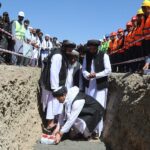Marking World Literacy Day on Sunday, the United Nations Assistance Mission for Afghanistan (UNAMA) said in a post on X that literacy has the potential to promote mutual understanding, social cohesion and peace.
“Let’s use its power for a more inclusive world & join our mission to making literacy accessible for everyone everywhere!” the post read.
In a separate statement, UNAMA said: “Literacy is a fundamental human right for all. It opens the door to the enjoyment of other human rights, greater freedoms, and global citizenship.
“Literacy is a foundation for people to acquire broader knowledge, skills, values, attitudes, and behaviors to foster a culture of lasting peace based on respect for equality and non-discrimination, the rule of law, solidarity, justice, diversity, and tolerance and to build harmonious relations with oneself, other people and the planet.”
For high school girls in Afghanistan, this day was yet another sad one for them as they are barred from going to school or university.
Some experts have said denying education to 50% of the population will result in a greater degree of illiteracy in the country
On the other hand, some experts believe that taking away the right to education for girls will lead to a “backward” society and a higher degree of illiteracy.
Other experts have also suggested that the young generation should not be denied an education.













